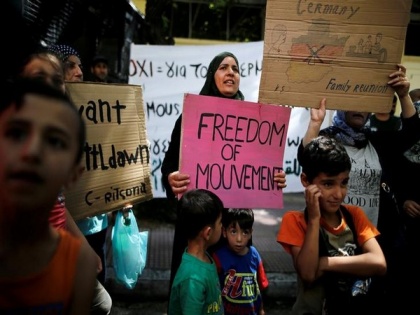Only Christian migrants allowed to save Europe's future, says German theology expert
By ANI | Published: January 25, 2020 12:07 PM2020-01-25T12:07:01+5:302020-01-27T13:12:55+5:30
To save the identity of Europe, Christians were identified from among the migrants who came as refugees from the conflict zones of the Middle East to take refuge in various European countries, according to an expert in systematic theology.

Only Christian migrants allowed to save Europe's future, says German theology expert
To save the identity of Europe, Christians were identified from among the migrants who came as refugees from the conflict zones of the Middle East to take refuge in various European countries, according to an expert in systematic theology.
In an op-ed piece which appeared in 'Refugees Deeply' and written by Ulrich Schmiedel, a lecturer in systematic theology at Ludwig-Maximilians-Universitat in Germany's Munchen, the writer explained how people went all-out to stage demonstrations in order to save the "Christian" identity in Europe after German Chancellor Angela Merkel's announcement in 2015 that her country would welcome all migrants fleeing from war-torn countries in the Middle East including those from Syria and Iraq.
As Europe grappled with the problem of refugees entering the continent, the writer said that religion was interpreted as a marker to differentiate European from non-European identity. Hence, most viewed Europe as "Christian" while non-Europe was construed as "non-Christian and identified with Islam.
"On all sides of the political spectrum, Christity is referenced as a motivation to save the identity of Europe -- either by advocating or by attacking humtarian policies of open borders," Schmiedel said.
Merkel's announcement led to fiery debates over refugees both inside and outside Germany. As both religious and non-religious orgsations played a significant role, amidst this, a movement called Pegida (the German acronym of 'Patriotic Europeans Against the Islamization of the West') took to the streets of Dresden and protested against what they perceived as "Islamisation".
The demonstration, which initially began as a small movement, soon had spin-offs both inside and outside Germany. In Dresden city itself, protestors carried a large illuminated cross, painted in colours of the German flag, in a bid to express their stance on the "Christian soul" of Europe.
The protests showed that Christity was viewed as a religion that should not welcome others. Instead, the demonstrators identified all migrants with Muslims and all Muslims with migrants, whom they perceived as a threat to Europe's "Christian culture".
"These theologies of belonging and believing are two polar extremes. Most Christian responses are located along a continuum between the two and display elements of both, sometimes in contradictory and sometimes in complementary ways," Schmiedel said.
"Theologies, then, inform public debates over the fortification or defortification of Europe as a response to increased immigration. Such critical questions about the future of Europe cannot be addressed without taking these theologies seriously," he added.
The writer continued, "Taking theologies seriously, however, could leave analysts and activists in an uncomfortable position because they have to tackle theologies in the plural - Christities, rather than Christity, with competing and conflicting claims about identity and immigration. But such discomfort might provide a promising point of departure to extract, rather than import or impose, principles and practices from Christity for turning 'Fortress Europe' into a home."
Merkel's announcement was echoed by other European countries including Slovakia and Poland which said that it would be ready to welcome refugees with open arms but preferably they should be "non-Muslims".
The Slovakian interior ministry told EUobserver in 2015 that it is "not a discriminatory country" and that "if some Muslim people come to Slovakia and decide to stay in our country and ask for asylum, they will be put in a normal asylum process".
The ministry, however, stated that Muslims do not want to reside in Slovakia and end up moving on to other EU countries with larger Muslim communities.
Also, then Polish prime minister Ewa Kopacz had termed Poland as a Christian country with a "particular responsibility" to help the Christian community. The country has taken in several Christian-only groups (paywall) of refugees sponsored by NGOs, according to Quartz.
Voicing similar sentiments, Bulgarian Prime Minister Boyko Borissov said that although his country has "nothing against Muslims", accepting Muslim refugees may lead to a demographic change -- Bulgaria has 60 per cent Orthodox Christian and 8 per cent Muslim.
The then Estonian minister of social affairs Margus Tsahkna, who strongly opposed taking in Muslim refugees was quoted by Quartz as saying, "After all, we are a country belonging to Christian culture."
Czech President Milos Zeman said that refugees "from a completely different cultural background" would not be a good fit.
The reactions of the European leaders comes despite the fact that cherry-picking migrants is against European law, which clearly states that discrimination on the basis of religion is specifically prohibited. Hence, most people fleeing from conflict-ridden countries in the Middle East seek refuge in Europe to live a dignified life.
( With inputs from ANI )
Open in app